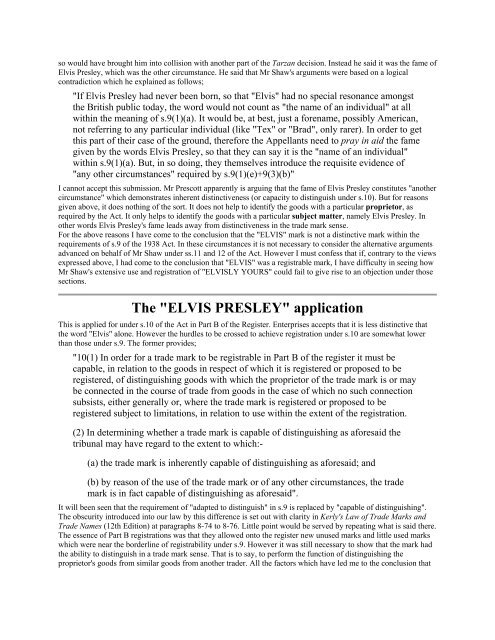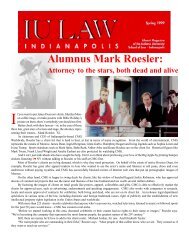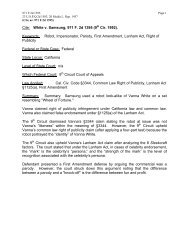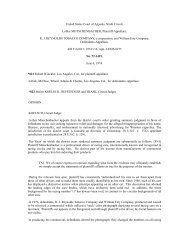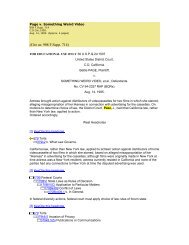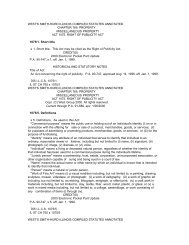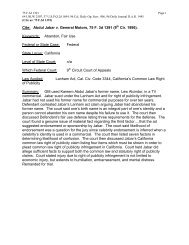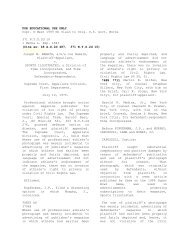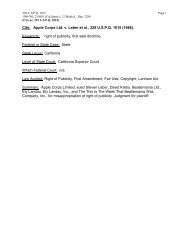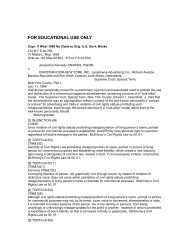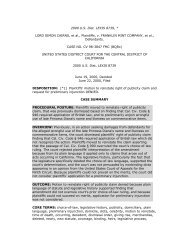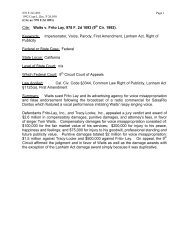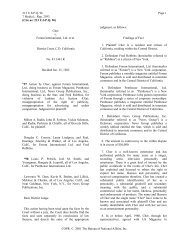Evidence of useDuring the course of his submissions, Mr Prescott was at pains to make it clear that he was only here to represent hisclients in relation to their application for Class 3 goods. He said he was not in a position to make any concessions orsubmissions in relation to any other products. Insofar as <strong>Enterprises</strong> is seeking to rely on use to support theirapplication for registration of this mark, primary importance must be given to evidence showing use in the UnitedKingdom of the mark on the goods covered by the registration and the impact that has had on the public.Mr Meade says that the evidence of use by <strong>Enterprises</strong> on Class 3 goods is vanishingly thin. Such evidence as thereis, is to be found by Mr Soden's statutory declaration. He says that <strong>Enterprises</strong> has since 1982 carried on asubstantial business which "included a wide range of products, including the goods for which registration is sought".He exhibits two catalogues demonstrating, but not exhaustive of, the typical product range sold by <strong>Enterprises</strong> and<strong>Elvis</strong> <strong>Presley</strong> himself. He also says;"... sales in the UK of products under the trademarks referred to above, includingproducts covered by the opposed Applications, were made in the 1980's through a retailoutlet in Blackpool operated by a Mr Todd Slaughter. The sales were discontinued whenMr Slaughter went out of business."Photocopies of what are referred to as "typical products of the Applicant sold through Mr Slaughter" are alsoexhibited.The sales made by Mr Slaughter can be dealt with quite quickly. No indication is given of how many products weresold nor their value. The exhibited documents do not suggest, let alone prove, that he ever sold any Class 3 products.The only Class 3 product, the photocopy for the packaging of which was exhibited to Mr Soden's declaration, bearsa price ticket in US dollars. There is no evidence that it was sold in the United Kingdom. Mr Prescott did not suggestotherwise. The catalogue exhibits are also of interest. The first is a document entitled "<strong>Elvis</strong> Collectibles" and isstated to be "An identification and Value Guide to hundreds of pieces of memorabilia for the most promotedcelebrity of them all." It has pictures of a large number of products sold by <strong>Enterprises</strong> or its licensees but alsoincludes some items which were not produced by them. The products depicted cover a wide range including an <strong>Elvis</strong>puzzle from England, various lapel badges bearing slogans such as "I like <strong>Elvis</strong>", "Don't blame me I voted for <strong>Elvis</strong>"and "<strong>Elvis</strong> for President", <strong>Elvis</strong> <strong>Presley</strong> Lipstick (with the advertising copy "Keep me always on your lips!"), <strong>Elvis</strong><strong>Presley</strong> "Teddy Bear" eau de parfum, <strong>Elvis</strong> <strong>Presley</strong> pocket watches with the numerals on the face replaced by theletters of his name, dog tags bearing the words "I'm an <strong>Elvis</strong> Fan" and the like. There is nothing to indicate which, ifany, of these products, save for the puzzle, were sold in the United Kingdom. The second catalogue is dated 1991,two years after the application date for the registrations in suit and appears to emanate from <strong>Enterprises</strong>. It alsoillustrates a wide selection of products of low inherent value. One of them, under the banner heading "NEW!" is"<strong>Elvis</strong> Cologne". There is nothing to suggest that this product was available before 1991 or that it has ever been soldin the United Kingdom. Other products include T-shirts carrying a picture of the performer over the word "<strong>Elvis</strong>",toothpick holders, cups, salt and pepper shakers and plates all bearing the legend "<strong>Elvis</strong> <strong>Presley</strong> / 1935-1977" and atie-pin bearing the words "#1 Fan - <strong>Elvis</strong>". Once again there is nothing to suggest that any of these have been sold inthe United Kingdom.This evidence is incapable of assisting <strong>Enterprises</strong>. It does not show that any products bearing the names "<strong>Elvis</strong>" or"<strong>Elvis</strong> <strong>Presley</strong>" were sold in the United Kingdom at any time. But more than that, insofar as it shows anything, itundermines the applicant's case. Not a single use of the names <strong>Elvis</strong> or <strong>Elvis</strong> <strong>Presley</strong> is in a trade mark sense. Theyare all uses which accurately refer back to the performer. When a cup is offered for sale bearing the legend "<strong>Elvis</strong><strong>Presley</strong> / 1935-1977" the use of the musician's name does not perform the function of enabling a customer todistinguish that cup as a cup emanating from <strong>Enterprises</strong> from other memorabilia from other suppliers. It is not anindication of trade origin at all. The fact that Mr Soden calls such use trademark use, does not mean that it is. Noattempt has been made to show that it was so regarded by any members of the public.Other circumstancesMr Prescott argued that there were also here 'other circumstances' within the meaning of s.9(3)(b) which indicateinherent distinctiveness. He said that the words "any other circumstances" are perfectly general and therefore it waspossible to take into account what he referred to as collateral circumstances which had demonstrated the mark tohave the necessary distinctiveness or to have acquired it. He did not suggest that <strong>Enterprises</strong>' relationship to theestate of <strong>Elvis</strong> <strong>Presley</strong>, whatever that relationship may have been, was such a collateral relationship. To have done
so would have brought him into collision with another part of the Tarzan decision. Instead he said it was the fame of<strong>Elvis</strong> <strong>Presley</strong>, which was the other circumstance. He said that Mr Shaw's arguments were based on a logicalcontradiction which he explained as follows;"If <strong>Elvis</strong> <strong>Presley</strong> had never been born, so that "<strong>Elvis</strong>" had no special resonance amongstthe British public today, the word would not count as "the name of an individual" at allwithin the meaning of s.9(1)(a). It would be, at best, just a forename, possibly American,not referring to any particular individual (like "Tex" or "Brad", only rarer). In order to getthis part of their case of the ground, therefore the Appellants need to pray in aid the famegiven by the words <strong>Elvis</strong> <strong>Presley</strong>, so that they can say it is the "name of an individual"within s.9(1)(a). But, in so doing, they themselves introduce the requisite evidence of"any other circumstances" required by s.9(1)(e)+9(3)(b)"I cannot accept this submission. Mr Prescott apparently is arguing that the fame of <strong>Elvis</strong> <strong>Presley</strong> constitutes "anothercircumstance" which demonstrates inherent distinctiveness (or capacity to distinguish under s.10). But for reasonsgiven above, it does nothing of the sort. It does not help to identify the goods with a particular proprietor, asrequired by the Act. It only helps to identify the goods with a particular subject matter, namely <strong>Elvis</strong> <strong>Presley</strong>. Inother words <strong>Elvis</strong> <strong>Presley</strong>'s fame leads away from distinctiveness in the trade mark sense.For the above reasons I have come to the conclusion that the "ELVIS" mark is not a distinctive mark within therequirements of s.9 of the 1938 Act. In these circumstances it is not necessary to consider the alternative argumentsadvanced on behalf of Mr Shaw under ss.11 and 12 of the Act. However I must confess that if, contrary to the viewsexpressed above, I had come to the conclusion that "ELVIS" was a registrable mark, I have difficulty in seeing howMr Shaw's extensive use and registration of "ELVISLY YOURS" could fail to give rise to an objection under thosesections.The "ELVIS PRESLEY" applicationThis is applied for under s.10 of the Act in Part B of the Register. <strong>Enterprises</strong> accepts that it is less distinctive thatthe word "<strong>Elvis</strong>" alone. However the hurdles to be crossed to achieve registration under s.10 are somewhat lowerthan those under s.9. The former provides;"10(1) In order for a trade mark to be registrable in Part B of the register it must becapable, in relation to the goods in respect of which it is registered or proposed to beregistered, of distinguishing goods with which the proprietor of the trade mark is or maybe connected in the course of trade from goods in the case of which no such connectionsubsists, either generally or, where the trade mark is registered or proposed to beregistered subject to limitations, in relation to use within the extent of the registration.(2) In determining whether a trade mark is capable of distinguishing as aforesaid thetribunal may have regard to the extent to which:-(a) the trade mark is inherently capable of distinguishing as aforesaid; and(b) by reason of the use of the trade mark or of any other circumstances, the trademark is in fact capable of distinguishing as aforesaid".It will been seen that the requirement of "adapted to distinguish" in s.9 is replaced by "capable of distinguishing".The obscurity introduced into our law by this difference is set out with clarity in Kerly's Law of Trade <strong>Mark</strong>s andTrade Names (12th Edition) at paragraphs 8-74 to 8-76. Little point would be served by repeating what is said there.The essence of Part B registrations was that they allowed onto the register new unused marks and little used markswhich were near the borderline of registrability under s.9. However it was still necessary to show that the mark hadthe ability to distinguish in a trade mark sense. That is to say, to perform the function of distinguishing theproprietor's goods from similar goods from another trader. All the factors which have led me to the conclusion that


